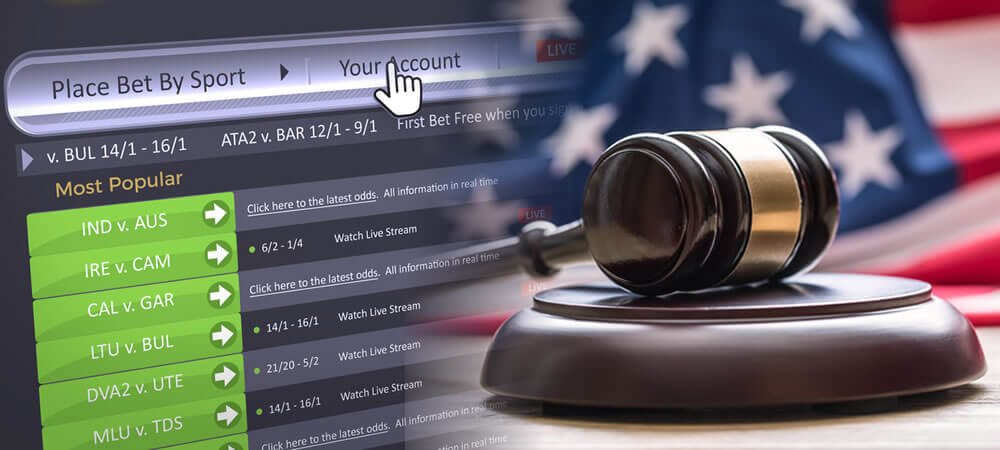- PASPA was repealed on May 14, 2018.
- Since the repeal, multiple states and Washington DC have regulated sports betting markets.
- Sportsbooks like DraftKings have gone public on the NASDAQ.
NEW YORK – The repeal of the Professional and Amateur Sports Protection Act (PASPA) will possibly go down as one of the biggest moments in the country’s sports betting history due to the almost instant impact it had on the nation.
Three years following the repeal, there have been nearly two dozen new markets, major corporations have sports betting partnerships, and sports entertainment as a whole has been permanently changed with major programs incorporating betting odds during the show.
While PASPA prevented states from launching their own legal sports betting markets for over two decades, the speed at which sports betting has become the norm shows that PASPA has become a distant memory.
What Was PASPA
PASPA was a bill that was voted into law in October of 1992 and it prevented most states from hosting their own regulated sports betting markets.
Because of this, only Nevada had full-scale legal sports betting within its lawbooks, making it the primary destination for betting on sports.
PASPA was repealed due to the efforts of a few states, led by New Jersey, who argued that the law was unconstitutional. After review, the Supreme Court overturned PASPA opening the floodgates to the currently thriving legal sports betting market in the US.
Since PASPA’s Repeal
It took almost no time for sports betting to become ingratiated into the fabric of the sports world as a whole. Almost immediately following the repeal, many states went to launch their own local markets and began seeing major benefits from the added monthly revenue stream.
Major leagues including the NBA, NFL, and MLB who were initially opposed to allowing for legal sports betting, believing it would ruin sports as we know it now have multi-million dollar deals with sportsbooks.
The new Pac-12 commissioner name-checking PASPA in his opening press conference is certainly a VERY good sign for those hoping the Pac-12 embraces sports betting.
— Ryan Kartje (@Ryan_Kartje) May 13, 2021
With major leagues embracing sports betting, sports media as a whole also slowly began to change. Major sports shows like ESPN’s First Take and Fox Sports Undisputed now having hosts use sports betting odds while discussing upcoming games and matchups.
Just one year before PASPA was repealed, you would be lucky to hear even the mention of odds on a major cable sports show, but now odds are used in tandem with stats when discussing which team has the edge.
Even restaurants have been affected, with fans now able to bet on sports at the same sports bars that they watch games in.
“As the largest sports bar in the country, Buffalo Wild Wings has the opportunity to pioneer sports gaming experiences for fans, and we are taking the first critical step on that journey through our partnership with BetMGM,” said Lyle Tick, President of Buffalo Wild Wings.
Since PASPA’s repeal, sports betting and overall sports entertainment have gotten seemingly permanently entwined with one another. The relationship meshed so well that it’s hard to imagine a world where betting and sports entertainment were separate.
Sports Betting Revenue
One of the major things that have been permanently affected by the repeal of PASPA is sports betting revenue. Many states now have a large source of added revenue they can rely on that didn’t exist as an option in the past.
Markets like New Jersey, Pennsylvania, and Colorado have boomed, with NJ specifically seeing upwards of $950 million in monthly betting handle.
This added income in the state is used for anything from education to city repairs. In fact, sports betting revenue has become a major talking point in legislation discussions, as multiple states regulated betting in hopes to recover from revenue losses during the COVID-19 pandemic.
Revenue from sports betting is now a valid source of income for states where three years prior it was not even a consideration.
Rise Of The Sports Betting Companies
States aren’t the only beneficiaries of the sports betting boom. With PASPA’s repeal, companies like DraftKings, Flutter Entertainment, and Penn National Gaming have boomed in value.
DraftKings is now a publicly-traded company following a $3.3 billion merger allowed them to be traded on the stock exchange. The company’s overall value has doubled in under a year since going public.
This success has led companies like Flutter Entertainment to push their FanDuel sportsbook to the NASDAQ, working on moves to make that a publicly-traded company as well.
Investors who make their money buying and trading stock are now reviewing the valuations of sports betting properties, something that was not even an idea prior to PASPA being overturned.
Looking back on the three years since PASPA was repealed by the Supreme Court, the overall landscape of sports, sports entertainment, states revenue, and stock investing has been greatly affected by the launching of legal sports betting markets.
As time progresses and sports betting becomes more entwined in everyday life, PASPA will continue to become a distant memory where fans couldn’t imagine a world without sports betting.
Advertising Disclosure
In order to provide you with the best independent sports betting news and content LegalSportsBetting.com may receive a commission from partners when you make a purchase through a link on our site.
News tags: California | DraftKings | FanDuel | Florida | Flutter Entertainment | Las Vegas | Lyle Tick | Nevada | New Jersey | New York | PASPA | Pennsylvania | sports betting

Coming from a background in narrative-based writing, Giovanni strives to write stories that will keep the reader engaged. Although he does pride himself in being accurate, how the story is told is also very important to him. When he’s not keeping readers up to date on sports betting laws and legislation, you can find him writing and recording music, playing videogames, or engaged in heated sports debates with his friends.


 College Football Betting
College Football Betting Best Online Sports Betting
Best Online Sports Betting Best Legal NFL Betting
Best Legal NFL Betting States With Legal Sports Betting
States With Legal Sports Betting Sports Betting Events
Sports Betting Events




